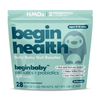How to Prevent Constipation When Starting Solids
share this article
 Starting solids is an exciting milestone, but it often comes with an unexpected challenge: constipation. It is incredibly common for babies to experience firmer stools, straining, or going several days without pooping when they begin solids. Fortunately, with the right foods, hydration, and gut-friendly strategies, you can help keep things moving comfortably.
Starting solids is an exciting milestone, but it often comes with an unexpected challenge: constipation. It is incredibly common for babies to experience firmer stools, straining, or going several days without pooping when they begin solids. Fortunately, with the right foods, hydration, and gut-friendly strategies, you can help keep things moving comfortably.
Here’s how to prevent constipation when starting solids while supporting your baby’s digestion and gut health.
Why Constipation Happens When Starting Solids
-
The digestive system is adjusting from an all-liquid diet (breastmilk or formula) to solid foods, which are slower to digest.
-
Many first foods are low in fiber (like rice cereal, plain bananas, or white bread).
-
The gut microbiome is still developing and may need extra support to handle new textures and nutrients.
Signs of Constipation in Babies Starting Solids
-
Fewer poops than usual (going more than 2-3 days without)
-
Hard, dry, or pebble-like stools
-
Straining or discomfort while pooping
-
Fussiness, gas, or a firm belly
How to Prevent Constipation When Introducing Solids
1. Start with Fiber-Rich First Foods
Skip refined grains as first foods and prioritize gut-friendly options like:
-
Avocado (fiber + healthy fats)
-
Mashed peas, lentils, or beans
-
Cooked carrots, sweet potatoes, or squash
-
Mashed pears, prunes, kiwi, or berries (great for digestion)
-
Oats or whole-grain infant cereals
2. Balance Binding Foods
Common first foods like bananas, rice, and toast can be constipating if not paired with higher-fiber options. If offering these, balance with foods like:
-
Prunes
-
Pears
-
Peas
-
Avocado
3. Support the Gut Microbiome with Prebiotics
Prebiotics are special fibers that feed beneficial gut bacteria and support stool softness. You can add prebiotics by:
-
Including foods like bananas, oats, beans, and sweet potatoes
-
Using a daily scoop of Beginbaby Prebiotic + Probiotics, which includes HMOs to feed beneficial bacteria like Bifidobacterium
4. Hydration Matters
As solids increase, babies need more fluids to help fiber work properly.
-
Continue offering breastmilk or formula as the primary nutrition.
-
Offer small amounts of water (1-2 ounces) with solid meals starting around 6 months.
5. Add Healthy Fats
Fats help lubricate the digestive tract. Include fats like:
-
Olive oil drizzled on veggies
-
Avocado mashed into meals
-
Full-fat yogurt (if dairy has been introduced)
6. Encourage Movement
Physical movement helps stimulate the bowels.
-
Tummy time, crawling, kicking, and gentle leg bicycles all support digestion.
7. Watch Portion Sizes at First
Starting with large amounts of solid food while digestion is still adjusting can contribute to constipation. Keep portions small, gradually increasing as your baby’s gut adapts.
When to Talk to Your Pediatrician
Check in with your pediatrician if:
-
Your baby goes more than 5-7 days without pooping.
-
Stools are consistently hard, dry, or painful to pass.
-
There is blood in the stool or significant discomfort.
Summary
Constipation is common when babies start solids, but it is often preventable. Focus on fiber-rich first foods, hydration, gut-friendly prebiotics, and plenty of movement to help support smooth digestion. A well-nourished gut helps lay the foundation for healthy pooping patterns and long-term gut health.
















